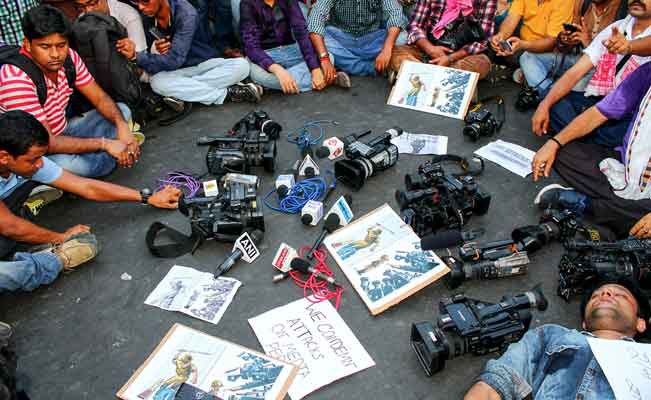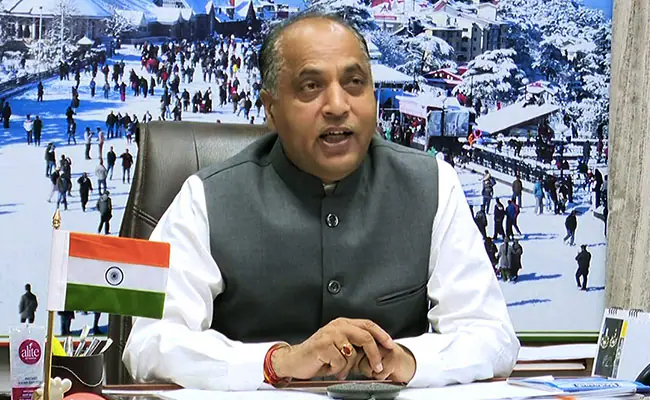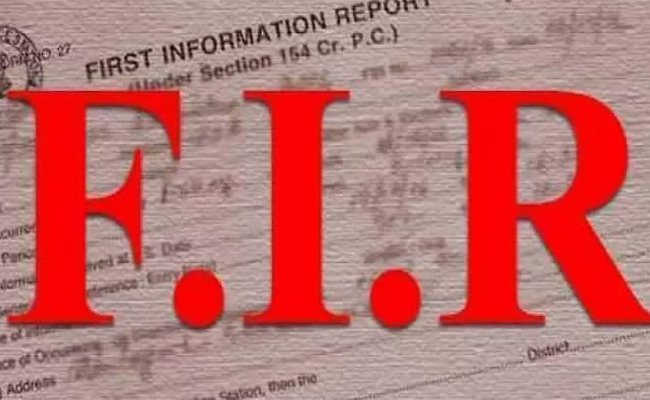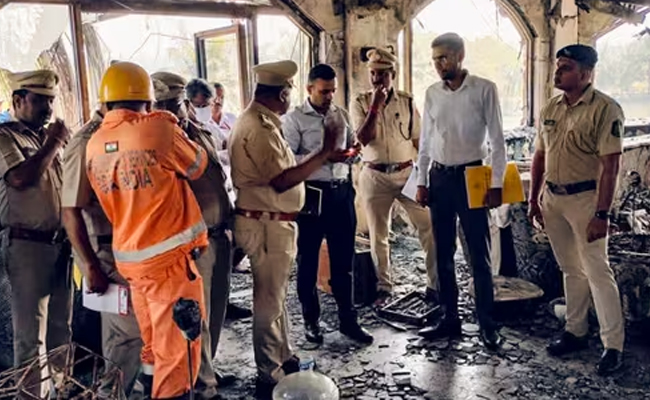United Nations (AP): Thousands of journalists have fled their home countries in recent years to escape political repression, save their lives and escape conflict – but in exile they are often vulnerable to physical, digital and legal threats, a UN investigator said on Wednesday.
Irene Khan said in a report to the UN General Assembly that the number of journalists in exile has increased as the space for independent and critical media has been “shrinking in democratic countries where authoritarian trends are gaining ground”.
Today, she said, free, independent and diverse media supporting democracy and holding the powerful to account are either absent or severely constrained in over a third of the world's nations, where more than two-thirds of the global population lives.
The UN independent investigator on the promotion and protection of the right to freedom of opinion and expression said most journalists and some independent media outlets have left their countries so they can report and investigate freely “without fear or favour”.
But Khan, a Bangladeshi lawyer who previously served as secretary general of Amnesty International, said exiled journalists often find themselves in precarious positions, facing threats against them and their families from their home countries without assured legal status or adequate support to continue working in their country of refuge.
“Fearing for their own safety or that of their families back home and struggling to survive financially and overcome the many challenges of living in a foreign country, many journalists eventually abandon their profession,” she said.
“Exile thus becomes yet another way to silence critical voices – another form of press censorship.”
Khan, whose mandate comes from the Geneva-based UN Human Rights Council, said there are international legal protections for journalists in exile who range from full-time professional reporters to bloggers publishing on the internet and elsewhere. The problem is “the failure of states to respect their obligations under international law”, she said.
In recent years, Khan said, hundreds of journalists have fled from Afghanistan, Belarus, China, Ethiopia, Iran, Myanmar, Nicaragua, Russia, Sudan, Somalia, Turkiye and Ukraine.
In addition, smaller numbers have fled from a range of other countries including Burundi, Guatemala, India, Pakistan and Tajikistan, “to name just a few”, she said.
Khan said there is no data on human rights violations committed by countries outside their borders. But there is anecdotal evidence including victims' testimony, scholarly research and the experience of civil society organizations suggesting that “a high prevalence” of such “transnational repression” targets exiled journalists and media outlets, she said.
Khan said “the butchering of exiled Saudi journalist, Jamal Khashoggi, in the consulate of Saudi Arabia in Istanbul was an outrageous, audacious act of transnational repression".
Khashoggi, a Washington Post columnist who entered the consulate on October 2, 2018, to get documents for his impending marriage, never emerged and his remains have never been found.
Khan also pointed to Turkiye's extraterritorial abductions and forcible return of at least 100 Turkish nationals, including journalists, from many countries, and Iran's targeting of exiled Iranian journalists and media outlets as well as Iranian and Iranian-origin journalists and media staffers working for the BBC Persian-language service.
In February 2020, she said, prominent Iranian exiled journalist Rana Rahimpour received death threats against herself, her husband, her children and her elderly parents.
Khan said the world witnessed a blatant example of forced abduction when Belarus authorities used a false bomb threat in violation of international law to divert a commercial airliner as exiled media worker Raman Pratasevich was travelling to the country's main airport in May 2021. He was arrested, convicted, sentenced to eight years in prison and later pardoned.
As for digital transnational repression, the UN special rapporteur said attempts to intimidate and silence journalists and their sources and promote self-censorship online have increased over the past decade.
Khan said common practices include “recruiting armies of trolls and bots to amplify vicious personal attacks on individual journalists to discredit them and their reporting, blocking exiled news sites or jamming broadcasts, and targeted digital surveillance”.
Online attacks including death threats, rape threats and smear campaigns have skyrocketed in the past 10 years, she said.
Digital surveillance also surged over the past decade as spyware enables authorities to access journalists' phones and other devices without their knowledge, Khan said.
In early 2022, journalists from El Salvador fled to Costa Rica, Mexico and elsewhere after civil society investigations reported the use of Pegasus spyware on their devices.
Khan said exiled journalists often face two major legal threats from their home countries: “investigation, prosecution and punishment in absentia, and the pursuit of their extradition on trumped up criminal charges”.
Hong Kong's recently adopted National Security Law, augmented by the Safeguarding National Security Ordnance, “criminalises secession, subversion, terrorism and 'collusion with foreign organisations' in sweeping terms and with extraterritorial reach”, she said.
It has been used extensively against independent journalists in Hong Kong and has hampered the work of journalists in exile and forced many to self-censor.
After Russia's February 2022 invasion of Ukraine, Khan said, it adopted draconian laws punishing anyone discrediting the armed forces or disseminating false information about the military operation. This has led independent media to self-censor, shut down or leave the country. Russian courts have issued sentences in absentia against several exiled journalists, she said.
Khan called for countries hosting exiled journalists to provide them with visas and work permits.
Exiled journalists also need better protection from physical and online attacks, long-term support from civil society and press freedom groups, and “they need companies to ensure that the technologies that are essential to practice journalism are not disrupted or weaponised against them”, she said.
Let the Truth be known. If you read VB and like VB, please be a VB Supporter and Help us deliver the Truth to one and all.
Visakhapatnam (PTI): Shafali Verma hit a blistering unbeaten 69 as India made short work of a paltry target to outclass Sri Lanka by seven wickets in the second Women’s T20 International here on Tuesday.
India now lead the five-match series 2-0 after another one-sided victory, having restricted Sri Lanka to a modest 128 for 9 through a collective display of disciplined bowling from the spin trio of seasoned Sneh Rana, ably complemented by young spinners Vaishnavi Sharma and Shree Charani.
During the chase, vice-captain Smriti Mandhana (14) fell cheaply but Shafali, enjoying new found confidence after a stellar show in the World Cup final, sent the bowlers on a leather-hunt during her 34-ball knock, winning it for her team in just 11.5 overs.
The hosts have now completed back-to-back successful chases within 15 overs which speaks volumes about the unit's sky-high confidence.
Shafali's innings had 11 punchy boundaries apart from a maximum.
The floodgates opened when left-arm spinner Inoka Ranaweera bowled a few flighted deliveries and Shafali would step out everytime to hit her over extra cover. Her footwork against slow bowlers was immaculate whether stepping out to loft the ball or rocking back to punch or pull.
Seeing her confidence, the newly appointed Delhi Capitals skipper Jemimah Rodrigues (26 off 15 balls) also attacked as the duo added 58 runs in just 4.3 overs.
By the time Rodrigues was out trying to hit one six too many, the match as a contest was over. Shafali completed her half-century off just 27 balls and completed the formalities in a jiffy.
Earlier, off-spinner Rana, who got a look-in after Deepti Sharma was ruled out due to fever, showed her utility keeping the Lankan batters under tight leash with figures of 1 for 11 in 4 overs, including a maiden which certainly is a rarity in T20 cricket.
Charani, who made an impression during India's ODI World Cup triumph, took 2 for 23 in her quota of overs, while Vaishnavi after an impressive debut in the opening encounter, finished with 2 for 32, not letting the Islanders get easy runs in her second spell.
The last six wickets fell for just 24 runs, but what stood out during India’s bowling effort was their superb ground fielding. After a patchy show in the previous game, the improved sharpness in the field resulted in three run-outs.
Sri Lankan skipper Chamari Athapaththu (31 off 24 balls) looked in good nick as she deposited length deliveries from seamers Kranti Gaud and Arundhati Reddy over the ropes but it was Rana, who kept her quiet by repeatedly pitching on good length.
Unable to manoeuvre the strike and with the big hits suddenly drying up, Athapaththu chanced her arm at another delivery in which Rana had shortened the length slightly.
Not having transferred the weight into the lofted shot, Athapaththu's hoick was pouched cleanly by Amanjot Kaur at long-off.
This was after Athapaththu's opening partner Vishmi Gunaratne (1) had offered a simple return catch to Gaud.
Hasini Perera (22 off 28 balls) and Harshitha Samarawickrama (33 off 32 balls) did stitch a stand of 44 but they could never set the tempo against the Indian spin troika.
Once Hasini offered a tame return catch off a Charani full-toss, Sri Lankans never recovered and lost wickets in a heap towards the end.





